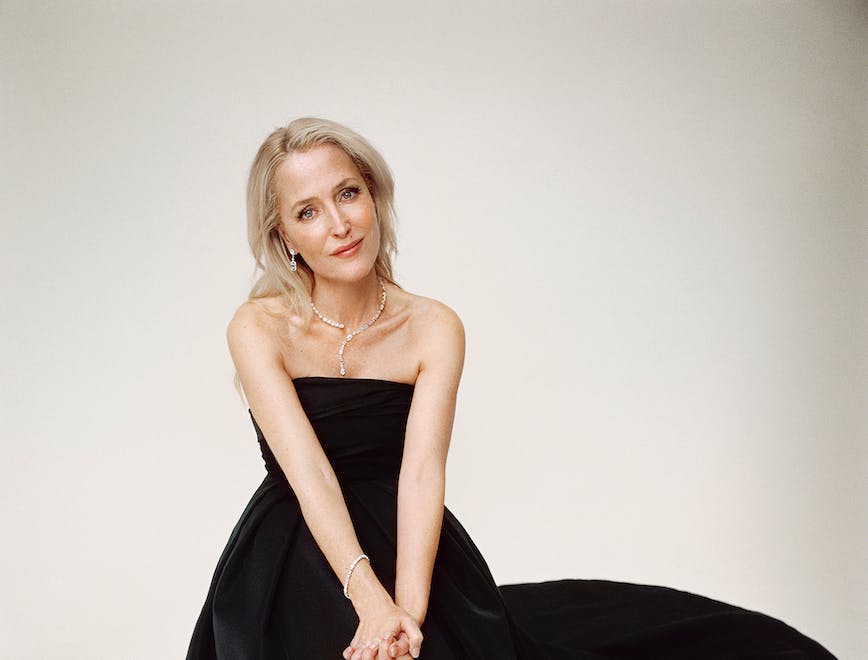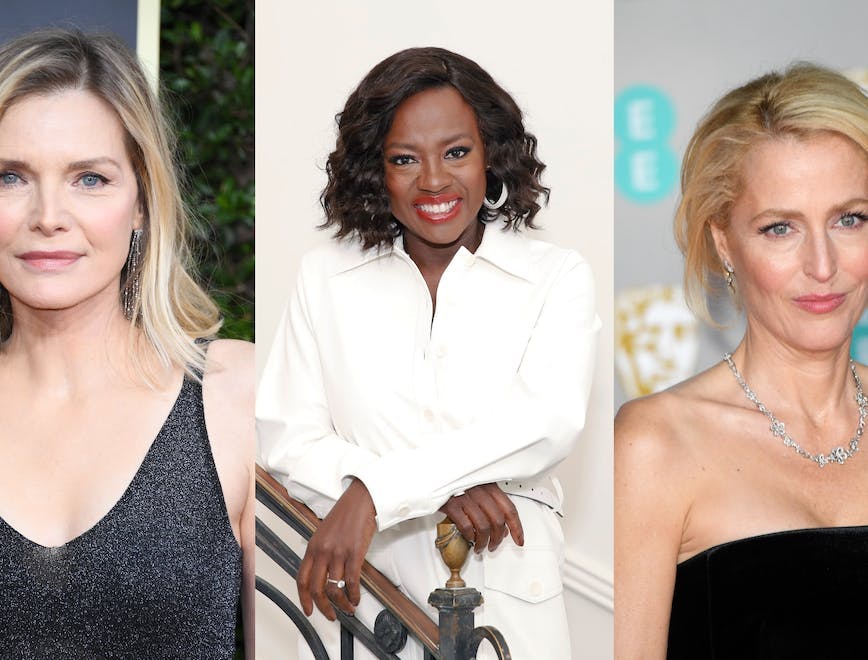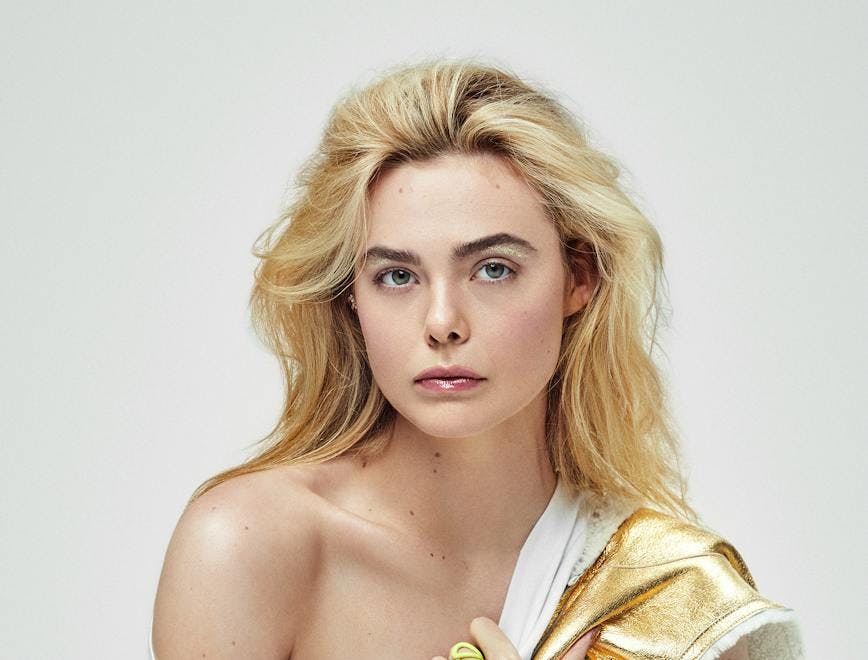Gillian Anderson Cements Her Icon Status in 'The First Lady'
Photography by Nick Thompson
Styled by Oliver Volquardsen
There are times when you interview actors, and you suspect they are not so much listening to the questions you ask as waiting for their chance to plug whichever project they’re working on at the moment. (This is also frequently true of most conversations, though non-actors’ projects are typically less glamorous.) Talking to Gillian Anderson is not like that. In conversation, the actress, activist, author, and newly-minted audio show host is generous, frank, and perhaps most importantly in our case, utterly undaunted by the lack of a clear WiFi connection in the Welsh farmhouse where she is staying with her sons for their half-term break.
Anderson, who rose to a peculiar combination of both intense cult and wide global fame in the 1990s thanks to The X-Files has, rather than coasting or playing to type, spent her career becoming one of the most interesting actresses working today, both on screen and off. In recent years she’s appeared in a string of critical and audience hits playing complicated, strong women: The Fall, Sex Education, The Crown, The Great, and most recently, The First Lady, in which she plays Eleanor Roosevelt, in tandem with Viola Davis as Michelle Obama and Michelle Pfeiffer as Betty Ford. Opportunities to play women like these don’t come along every day, Anderson says: “One kind of has to say yes before you think about it too hard.”
GILLIAN ANDERSON: I have to warn you, I’m in a farmhouse in Wales and the internet is not very good, and I’ve just come in from the side of a mountain, so we’ll just have to see how it goes!
ALESSANDRA CODINHA: No problem, what are you doing in Wales?
GA: My boys are on half term and they race mountain bikes.
AC: Do you bike along too?
GA: No-no-no-no...no.
AC: You’re a very good and patient mother for doing that trip, then. Congratulations, I saw you just won an Icon award at the Canneseries festival. What was that like?
GA: I mean, what I said when I was there is that one can’t really refer to oneself as an icon; it has to be stated by others. And the only way I can really think about [being an icon] at all is in relation to some of the characters that I’ve played who are historical or literary icons in a way. And that if through them that is a perception of me then—lovely!
AC: I just watched the first five episodes of The First Lady. You’re terrific as Eleanor Roosevelt. What appealed to you about the role?
GA: Well, she appeals to me. I have admired her altruism and her action for some time. It wasn’t really until I started doing the research and diving into her whole life, and the hardship that she experienced when she was younger, that I realized the degree to which she dedicated her life to service...she had real deeply-felt compassion for human beings who were suffering. It was an honor to spend time as her and to have permission and a reason to properly [study] her. I’m very glad I said yes. Even though at the beginning I was like, What?! I’m 5’3” and she’s almost six feet tall; it doesn’t make any sense! But hopefully people won’t be thinking about that.
AC: I doubt anyone will. I feel like you’ve really got the strong-woman market covered. What do you look for in a role?
GA: I don’t feel like I make a beeline for quote-unquote strong women....you know, I am as equally drawn to—and should possibly start focusing more on—women who find life a bit more challenging than some of the women that I’ve been playing, who really struggle, who may be strong in terms of their resilience but who struggle with the day-to-day things that life throws at them. That interests me as an actor and as a human being more than outright trailblazers. So you’re right that I do have the market cornered on it in a sense, but it’s not actually on purpose? I would like to shake it up a bit more. I want to keep it interesting.
"I would like to shake it up a bit more. I want to keep it interesting."
AC: After Sex Education was such an enormous hit, did people come up to you with sex questions all the time?
GA: You know, they didn’t. I only had that happen once with one very drunk man shortly after it came out and I thought, Oh shit—is this my life now? But that was a one-off. I’ve been spared.
AC: Did you always want to be an actress?
GA: Not always. I was pretty seriously considering marine biology when I was younger, even though I was afraid of the ocean. I mean not like afraid afraid—actually, if I’m entirely honest I kind of am afraid. And I wanted to study sharks, but I’m terrified of sharks. I don’t know where that idea came from, and how real it really was before I discovered acting and found that it was something that not only I could do, but that other people thought I could do, too. Acting kind of shifted my whole life outlook and focus, so that was a big deal in my life.
AC: When was that?
GA: I was maybe 12. We’d moved from London to Michigan, and I feel like the idea to act or the desire to act was already inside me, but I can’t remember what instigated it. And then I auditioned for something and didn’t get it and thought, Oh well, that’s it then; I’m clearly not any good. But I ended up trying again and being cast. I felt like I had a purpose all of a sudden.
AC: I feel like someone more psychoanalytically adept than I could draw an immediate connection between your wanting to be a marine biologist, submerged with sharks, and wanting to act, submerged in a character. I am not that confident in my analytical abilities, but there’s something there!
GA: That’s interesting. I haven’t thought about that before. There’s definitely a submerging, and it feels sometimes like it’s as dangerous. Acting does feel like it’s as potentially life-threatening as swimming with sharks could be. There’ve been times when I’m about to walk out on stage for the first audience and thought that I might just die. [Laughs.] I might just collapse and die.
AC: When you take on a role, is it hard to leave it behind when it’s over? Do you take it with you?
GA: I don’t really take it with me. The only one I’ve ever taken with me is Blanche Dubois, and I don’t know why that is. [Ed note: Anderson starred in a theatrical run of A Streetcar Named Desire in London in 2014 and New York in 2016.] Whenever I answer a question like this I always want to preface it by saying that I don’t think any of the other characters were less important to me, but then I stop myself, because there was something profound about my connection to her, and maybe there is no one like her; maybe there will never be anyone like her for me, and that needs to be okay. And so then I’m talking about the second tier of characters, which are phenomenal experiences and phenomenally important both in my life and career and to the audience members who connect with them. But I for some reason am able to leave them at the door. I’m sure the people I live with would say that maybe when I was playing Margaret Thatcher I behaved a little differently, but I’m pretty sure that I leave them there.
AC: Do you prefer stage acting to film and TV? Is there a preference?
GA: I’m very grateful that I get to do all of it, and that is my preference. My preference is that every once in a while I do a play, and in between I do the other stuff. I wouldn’t want to do a play more than every three years; I don’t think I have more than that in me. I do really enjoy it, but also it absolutely terrifies me. There’s always that reckoning for long periods of time until you are a couple of weeks into it, up on your feet, properly getting to play within its boundaries night after night. Until that point, really from the moment you start rehearsal, you’re kind of in an Oh shit phase: Oh shit, what have I signed up for?
AC: Tell me about your new audio show, What Do I Know?!
GA: It’s been fascinating—as much to read the voices of other writers and journalists as it is to learn about the various people, things, and events that I might not necessarily be aware of. It’s a celebration of a diverse set of voices telling very human stories. I enjoy it.
AC: I read the book that you did with Jennifer Nadel, We: A Manifesto for Women Everywhere. What was that experience like for you?
GA: It was both a wonderful and very cathartic experience, and it was also very difficult. I really enjoy writing, but I don’t do well on deadlines. I’m always sympathetic to writers whenever I’m given a deadline. I’m really, really glad that we did it; I’m glad I did it with Jen, and she’s much more in touch with the people who have read it and who have responded and communicated about the impact that aspects of it have had on their lives, and so that is amazing.
AC: What’s your relationship with art?
GA: I feel like I have a big relationship with art, but in the way that I don’t really pay attention to new up-and-coming artists. I have art in my life, and I go through periods where I go to galleries regularly. I have favorite artists, and I’m pretty good at identifying artists, but it’s not anything that I have studied. I feel pretty out of the loop.
"Acting kind of shifted my whole life outlook and focus...I felt like I had a purpose all of a sudden."
AC: Who are some of your favorite artists?
GA: It’s funny because I would not have said this until I found myself standing in front of one, but definitely Rothko. I was so profoundly moved by a show in London a few years ago, and I was really shocked by it, really surprised by it, because I didn’t really get it before that, get him, or the attraction to his work. I love Peter Doig, Louise Bourgeois, Sarah Lucas, and Kara Walker. I like a lot of photographers: Jill Greenberg, who does these really large-format photographs that almost look like paintings. And some classics: I love Van Gogh, and some of Picasso’s periods. I love Balthus. I’ve got a very wide range. [Laughs.]
AC: What do you look for in a piece primarily? Is it an emotional response?
GA: Definitely. Definitely. I’ve stood in front of art and wept before. And I can’t tell you how much of that has to do with the artist and what they are transmuting onto the canvas, or board or whatever the medium is, and how much is just purely to do with me, and what I’m going through at that particular time, and how that affects what strikes me. For someone like a Rothko or a Brice Marden or some of these painters who spend years on a single piece, there are some who would say that it’s that; it’s their presence that’s being infused into the works. And I certainly subscribe to that. I had an experience many years ago where I was looking at some Aboriginal art and started crying, and it was just squiggly lines, very colorful squiggly lines. The artist was actually there at the gallery and walked up behind me and told me it was a painting of a massacre that happened at the village, and we ended up having an hours-long conversation about Aboriginals in Australia and their relationship with their art. And then he showed me a map that was done on the ground; it looked almost like sand painting, but it was a song of a map, and he sang the song of the map to me. It was quite an extraordinary conversation that completely blew my mind open, thinking about the different ways that things are and can be communicated and how we do or do not absorb them. And the degree to which we’re paying attention at any given moment and what of that is our experience, what of that is their experience, and what of that is a third way of seeing.
HAIR James Rowe
MAKEUP Florrie White
MANICURE Jessica Thompson
TAILOR Audra Budvytiene
DOP Jan Vrhovnik
LIGHTING Benjamin Kyle
PRODUCTION Alexandra Oley
PHOTO ASSISTANT Dan Burwood
STYLIST ASSISTANT Emily Powelle
SET ASSISTANTS Killian Fallon and Lucy Swan
L'OFFICIEL Art Spring 2022 is available for pre-order online here.










